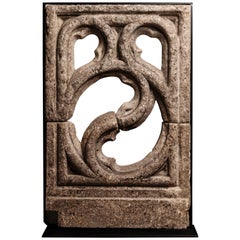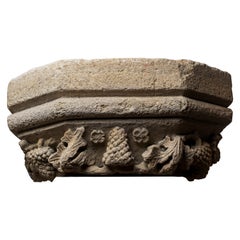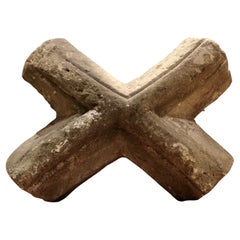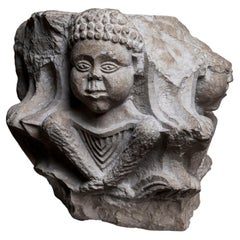Want more images or videos?
Request additional images or videos from the seller
1 of 5
Gothic Limestone Balustrade
$9,563.93List Price
About the Item
- Dimensions:Height: 25.6 in (65 cm)Width: 21.26 in (54 cm)Depth: 8.27 in (21 cm)
- Style:Gothic (Of the Period)
- Materials and Techniques:
- Place of Origin:
- Period:
- Date of Manufacture:15th Century
- Condition:Additions or alterations made to the original: a little piece has been added on the right part of the balustrade (visible in the pictures). Wear consistent with age and use.
- Seller Location:Bruxelles, BE
- Reference Number:1stDibs: LU6666233656482
About the Seller
5.0
Vetted Professional Seller
Every seller passes strict standards for authenticity and reliability
1stDibs seller since 2022
15 sales on 1stDibs
Typical response time: 1 hour
Authenticity Guarantee
In the unlikely event there’s an issue with an item’s authenticity, contact us within 1 year for a full refund. DetailsMoney-Back Guarantee
If your item is not as described, is damaged in transit, or does not arrive, contact us within 7 days for a full refund. Details24-Hour Cancellation
You have a 24-hour grace period in which to reconsider your purchase, with no questions asked.Vetted Professional Sellers
Our world-class sellers must adhere to strict standards for service and quality, maintaining the integrity of our listings.Price-Match Guarantee
If you find that a seller listed the same item for a lower price elsewhere, we’ll match it.Trusted Global Delivery
Our best-in-class carrier network provides specialized shipping options worldwide, including custom delivery.You May Also Like
Antique Gothic Carved Limestone Model of a Madonna or Venus
Located in Philadelphia, PA
A fine antique limestone carving.
Modeled as a Madonna.
With her head slightly tilted, holding an orb in one hand, and with her other hand resting on her breast.
By repute ...
Category
Antique 15th Century and Earlier Unknown Gothic Figurative Sculptures
Materials
Limestone
Medieval Architectural Fragment Cornice, Corbel
Located in Vosselaar, BE
A fragment of a sandstone corbel with flat upper face, moulded transverse ledge and two protruding lobes with reserved trefoil detailing. The lower edge has fine dentiled carving and...
Category
Antique 15th Century and Earlier British Gothic Figurative Sculptures
Materials
Sandstone
Bronze Woman Sculpture Door Stop Bookend
Located in Los Angeles, CA
A wonderful sculptural figure of a lady, intricate in detail and wearing women's medieval attire and hat.
A good weight at 18 lbs - use as a heavy duty bookend, decor or door sto...
Category
Early 20th Century French Medieval Figurative Sculptures
Materials
Bronze
Gothic Virgin and Child from Flanders
Located in Saint-Ouen, FR
Exhibition
Museum Cantini, 1952, The art of the Middle Ages in the Marseille collections, n°101
Provenance
Former collection Louis Bresset (before 1952)
Former collection Profe...
Category
Antique 15th Century and Earlier Dutch Gothic Figurative Sculptures
Materials
Oak
Important 14th Century Polychrome Limestone Virgin from Lorraine
Located in Saint-Ouen, FR
Provenance :
- Kunsthaus Heinrich Hahn, Frankfurt am Main, sale 16, June 17, 1930, lot 16.
- Sotheby's, Amsterdam, Feb. 26, 2006, lot 201.
HISTORIC
Located between Moselle valley and Meuse valley, framed by the Vosges Mountains on the south side and the duchy of Luxembourg on the north side, the duchy of Lorraine is the result of several partitions. It starts with the 9th century when the Carolingian empire is divided, with Lothar 1st inheriting Lotharingia. In 959 this territory was in turn divided in two; Lower and Upper Lotharingia, the latter being the forebear of the duchy of Lorraine. This duchy was under the rule of the Holy Roman Germanic Empire until 1736 when it was absorbed by the kingdom of France.
All along its history the duchy of Lorraine has found itself in the midst of many conflicts. Alliances and feuds marking European history were always particularly sensible in Lorraine where instability was frequent. Because of its geographic position the duchy of Lorraine was also an artistic crossroad.
Hence the duchy of Lorraine becomes from the 13th century onwards an important artistic centre where a particular type of Virgin and Child appears. According to professor J. A. Schmoll the characteristics of Lorraine sculpture burgeon around 1280-1300 in the Aube region. It presents “vigorous volumes, restrained movements, rare but solemn gestures and a strong interiorised and stern expression”. Those Virgins look similar with a wide forehead, a shield- or oval-shaped face, large neck, small lips and a cleft chin.
This model is particularly in favour during the 13th century because of the revival for Marial worship and for the theme of the Virgin and Child. It bears witness to a new religious sensibility with a more intimate vision of religious practice.
DESCRIPTION
The important 14th century Virgin we present to you is one of the most beautiful examples of sculptural art from Eastern France, with her fascinating distant gaze.
Her contrapposto posture is induced by the weight of the child she carries high on her left side. The child has a chubby face framed by blond hair with well defined curls and he wears a long red V-collared tunic from which emerge his feet. The fabric is animated by long folds. The position of the right foot turned to the back is a detail we can notice on several Virgins from Lorraine. He holds a bird that seems to be pecking his thumb.
“The bird /held by the child in his hands/ has been read as a reference to an episode from Christ’s childhood when he has moulded sparrows with clay before giving them life. It appears in the apocryphal gospel of Pseudo-Matthew (ch. 27) and later in the Quran (III, 43, v. 110). However the iconography seems to be more influenced by the concept of Redemption or of Eucharist, the bird symbolising the soul of the Christian about to be redeemed or revitalised.”
Mary wears a long dress with two rock crystal cabochons remaining from the original five. She is covered by a red cloak enriched with old-gold motifs draped as an apron falling in long pleats along her left hip. The relief treatment and the volume of the cloak developing a network of concentric pleats contrast with the the flat pleating of her dress. They nevertheless suggest the curve of her bent right leg.
She wears a floret crown securing a short thin veil carved in very low relief. From it emerges her blond curled hair characteristic of the 13th century. The large face with almond-shaped eyes, straight nose, small lips and cleft chin casts its gaze afar in a fashion typical of 13th century Virgins.
In her right hand she holds a lily flower. In a very refined manner the artist has carved a band on her right ring-finger.
In the back, carefully sculpted, spreads the minutely detailed short veil.
COMPARATIVE STUDIES
This sculpture of great quality presents obvious similarities with Virgins from Lorraine, designated by William Forsythe...
Category
Antique 15th Century and Earlier French Gothic Figurative Sculptures
Materials
Limestone
$143,458
H 44.89 in W 18.9 in D 15.75 in
Gothic Architectural fragment abstract sculpture
Located in Vosselaar, BE
We mounted this Gothic architectural fragment on a custom iron stand. In this new context it becomes a sculpture with a almost abstract f...
Category
Antique 15th Century and Earlier French Gothic Mounted Objects
Materials
Sandstone
Pair of Plaster Gothic Crocketed Finials
Located in Chicago, IL
This pair of cast plaster Gothic finials exudes the elegance and intricacy of Gothic architectural design. Each finial is adorned with floral form crockets, meticulously crafted to r...
Category
21st Century and Contemporary French Gothic Mounted Objects
Materials
Plaster
Interesting Set of 5 Sculptural Cypress Knees, Organic Art
Located in Los Angeles, CA
Set of 5 interesting sculptural cypress knees, organic art.
Category
Late 20th Century Unknown Adirondack Figurative Sculptures
Materials
Cypress
19th Century French Carousel Ride, Carved Wood Sparrow with Metal Body
Located in New York, NY
19th C. painted wood French Carousel ride, with the "body" made of iron rods. The bird figure has only one wing, as originally the other side had a spoke which connected to the cente...
Category
Antique 19th Century French Folk Art Architectural Elements
Materials
Metal
Griffin Plaque
Located in Bloomfield Hills, MI
Rescued from a building in Detroit MI, this turn of the century plaque provides a grand embellishment in a manner that can’t be replicated.
A truly ...
Category
Vintage 1920s American Art Deco Mounted Objects
Materials
Stone
More From This Seller
View AllCarved Limestone Balustrade, North of France, First Half of the 15th Century
Located in Bruxelles, BE
Carved Limestone balustrade.
In a modern metal frame.
North of France, Ile de France or Normandy.
End of the 14th century - first half of the 15th century.
Measures: 90 x 62 x 8...
Category
Antique 15th Century and Earlier French Medieval Architectural Elements
Materials
Limestone
$14,345 Sale Price
20% Off
Large Hexagonale Base of Pilaster in Burgundy Stone, Burgundy, 15th Century
Located in Bruxelles, BE
Large base of molded hexagonal pilaster in burgundy stone carved with vines, grapes and rosettes in high relief.
Burgundy, 15th century
28 x 63 x 30 cm
Provenance : collection De...
Category
Antique 15th Century and Earlier French Gothic Architectural Elements
Materials
Stone
$6,216 Sale Price
20% Off
Gothic Keystone - France, 14th century
Located in Bruxelles, BE
Gothic Keystone
Limestone
France, 14th century
33 x 47 x 26 cm
A striking relic of Gothic architecture, this keystone captivates with the purity and power of its intersecting forms....
Category
Antique 15th Century and Earlier French Gothic Architectural Elements
Materials
Limestone
Rare Romanesque Capital Depicting Four Africans, Apulia, 13th Century
Located in Bruxelles, BE
Large stone capital carved on each side in strong relief. The basket is covered with two crowns of vertical acanthus leaves which sprout from the astragal and fill the space between ...
Category
Antique 15th Century and Earlier Italian Medieval Architectural Elements
Materials
Stone
$21,997 Sale Price
20% Off
Gothic Canopy, France, 15th Century
Located in Bruxelles, BE
Gothic canopy
France, 15th century
Alabaster, some traces of polychromy
33 x 23 x 20 cm
Provenance:
- Private collection Genève, Switzerland
...
Category
Antique 15th Century and Earlier French Gothic Figurative Sculptures
Materials
Alabaster
Gothic crowned Head - Île de France, 14th century
Located in Bruxelles, BE
Head of a crowned Virgin
Île-de-France, first half of 14th century.
H26 x 14 x 14 cm
Provenance :
- Private Collection, Paris France (1960)
- Private Collection Tuscany, Italy (19...
Category
Antique 15th Century and Earlier French Gothic Figurative Sculptures
Materials
Stone



